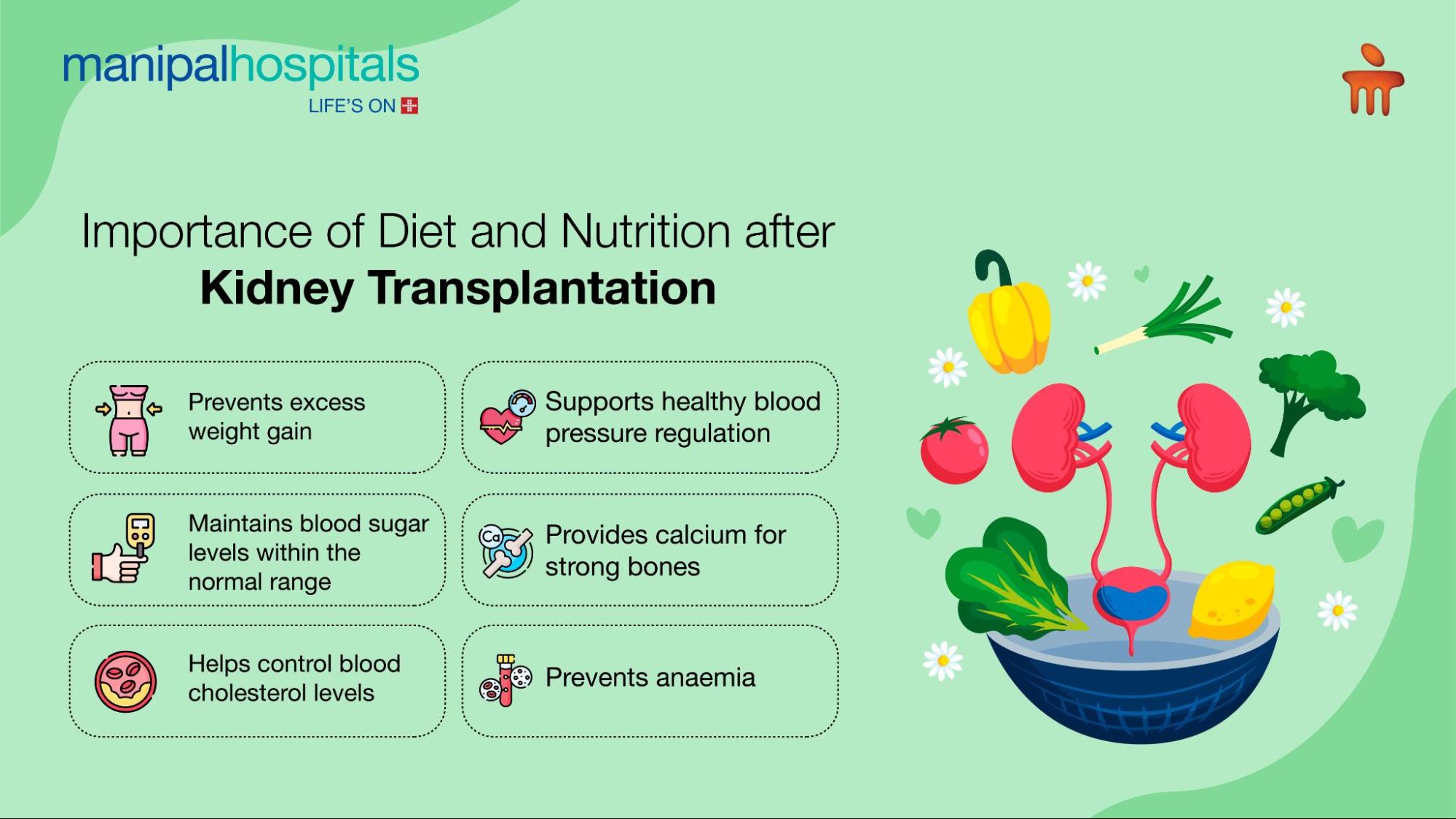Around 151 to 232 individuals per million population suffer from end-stage renal disease and may require Kidney Transplantation.1 This life-changing procedure offers a new lease of life to chronic patients. However, the challenges don’t end with getting a transplant, as post-transplant care is vital. Maintaining a healthy lifestyle, particularly following a kidney-friendly diet, is essential for the longevity of the transplanted kidney and overall well-being.
Following a Kidney Transplant patient's diet also aids in faster recovery, managing weight and blood pressure, and reducing the side effects of immunosuppressive medications. This blog will help you explore the sample diet chart for Kidney Transplant patients recommended by doctors.
Synopsis
Importance of Diet and Nutrition after Kidney Transplantation

Life is difficult for end-stage renal failure patients before a Kidney Transplant. Post-transplant, patients are also required to follow a proper diet plan to reduce the risk of infection and rejection. In addition, taking immunosuppressive medications may cause side effects like increased appetite, elevated blood sugar levels, and high cholesterol. Adopting a balanced and nutrient-rich diet can help mitigate these effects and improve overall health outcomes.
Other benefits of having a proper diet include:
-
Prevents excess weight gain
-
Maintains blood sugar levels within the normal range
-
Helps control blood cholesterol levels
-
Supports healthy blood pressure regulation
-
Provides calcium for strong bones
-
Prevents anaemia
Diet Chart for Kidney Transplant Patients
The diet for a Kidney Transplant patient should be balanced, low in sodium, and rich in nutrients to support recovery and maintain kidney health. A balanced diet should include a variety of fresh fruits and vegetables, lean protein, reduced-fat dairy products, whole grains, and adequate water intake. Staying well-hydrated is crucial for the health of your new kidney, so drink plenty of water and limit caffeine-containing beverages.
Here is a sample general diet chart recommended by our nephrologists and dieticians for Kidney Transplant patients:
-
Morning: Start your day with a glass of lukewarm water with a dash of lemon. For breakfast, you can take one bowl of dalia (broken wheat) or poha with vegetables. Also, add one boiled egg or paneer cube, a small portion of seasonal fruits (e.g., apple, guava, or papaya), and a herbal tea or a glass of skimmed milk.
-
Mid-Morning Snack: Take a handful of unsalted nuts (almonds or walnuts) and one small cup of low-fat curd.
-
Lunch: Take one medium-sized chapati or half a cup of steamed rice with a bowl of dal or rajma with minimal oil. Add a serving of steamed or sautéed vegetables (like spinach, beans, or pumpkin), a green salad with cucumber, tomato, and carrot along with a glass of buttermilk (low salt).
-
Afternoon Snack: Add a piece of fruit (like an orange or pear), a handful of roasted makhana (fox nuts), or murmur (puffed rice).
-
Dinner: Start your dinner with a bowl of clear soup, such as moong dal or tomato soup. Add one chapati with a bowl of sabzi (vegetable curry) made with minimal oil and spices. Also add protein by taking a small portion of grilled chicken, fish, or paneer.
-
Evening Snack: Take a glass of warm milk with a pinch of turmeric along with a digestive biscuit or a small handful of nuts.
General Diet Tips
-
Hydration: Drink adequate amounts of water throughout the day, or as per your doctor's recommendations.
-
Salt Intake: Limit salt to help control blood pressure.
-
Protein: Adjust protein intake based on your medical advice. While protein is necessary, avoid consuming it in excess as it can strain the kidney.
-
Avoid High-Potassium Foods: Depending on your lab results, limit high-potassium foods such as bananas, oranges, and potatoes if recommended.
-
Low-Fat Choices: Opt for low-fat dairy and cooking methods such as grilling, baking, or steaming.
Conclusion
A well-balanced diet is fundamental for Kidney Transplant patients to support their recovery and long-term health. By making informed dietary choices and following your doctor's recommendations, you can lead a healthy and fulfilling life post-transplant. While the sample diet chart provided serves as a guideline; always consult your healthcare provider or a registered dietitian for personalized advice. Seek consultation at Manipal Hospitals, Bhubaneswar, for expert guidance.
FAQ's
Drinking alcohol in moderation is normally approved for Kidney Transplant patients, but it’s crucial to ask your doctor before consuming alcohol following the transplant. The general recommended limit is no more than 14 units of alcohol per week, including at least a few alcohol-free days.
Most people, including those who have had kidney transplants, believe that green tea is safe. To make sure that green tea or other herbal teas won't conflict with your prescription drugs or health, you should speak with your doctor before ingesting them.
-
Eat and drink the right things
-
Take regular exercise
-
Maintain a healthy weight
-
Avoid smoking
Consult our nephrologist for guidance on leading a satisfying life following the transplant.
After a Kidney Transplant, it is best to avoid fruits like grapefruit (due to medication interactions), bananas, oranges, pomegranates, avocados, and coconuts (due to high potassium content). For personalised dietary advice, consult a dietician or a nephrologist.
You can schedule an appointment at Manipal Hospitals, Bhubaneswar, by contacting us or visiting our website.
Visit: https://www.manipalhospitals.com/bhubaneswar/specialities/urology/
Contact no: 0674 666 6600



















 5 Min Read
5 Min Read











.png)




